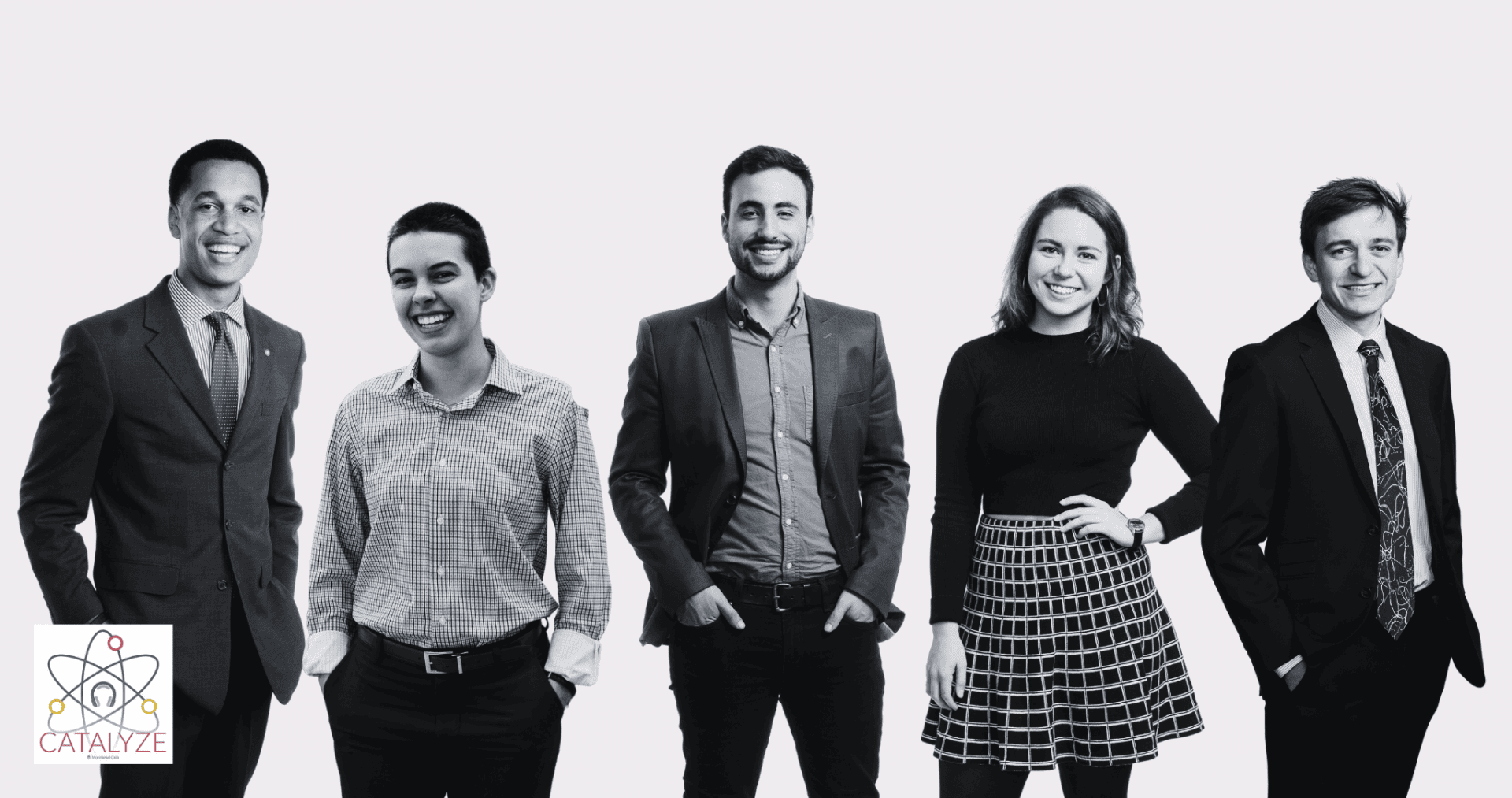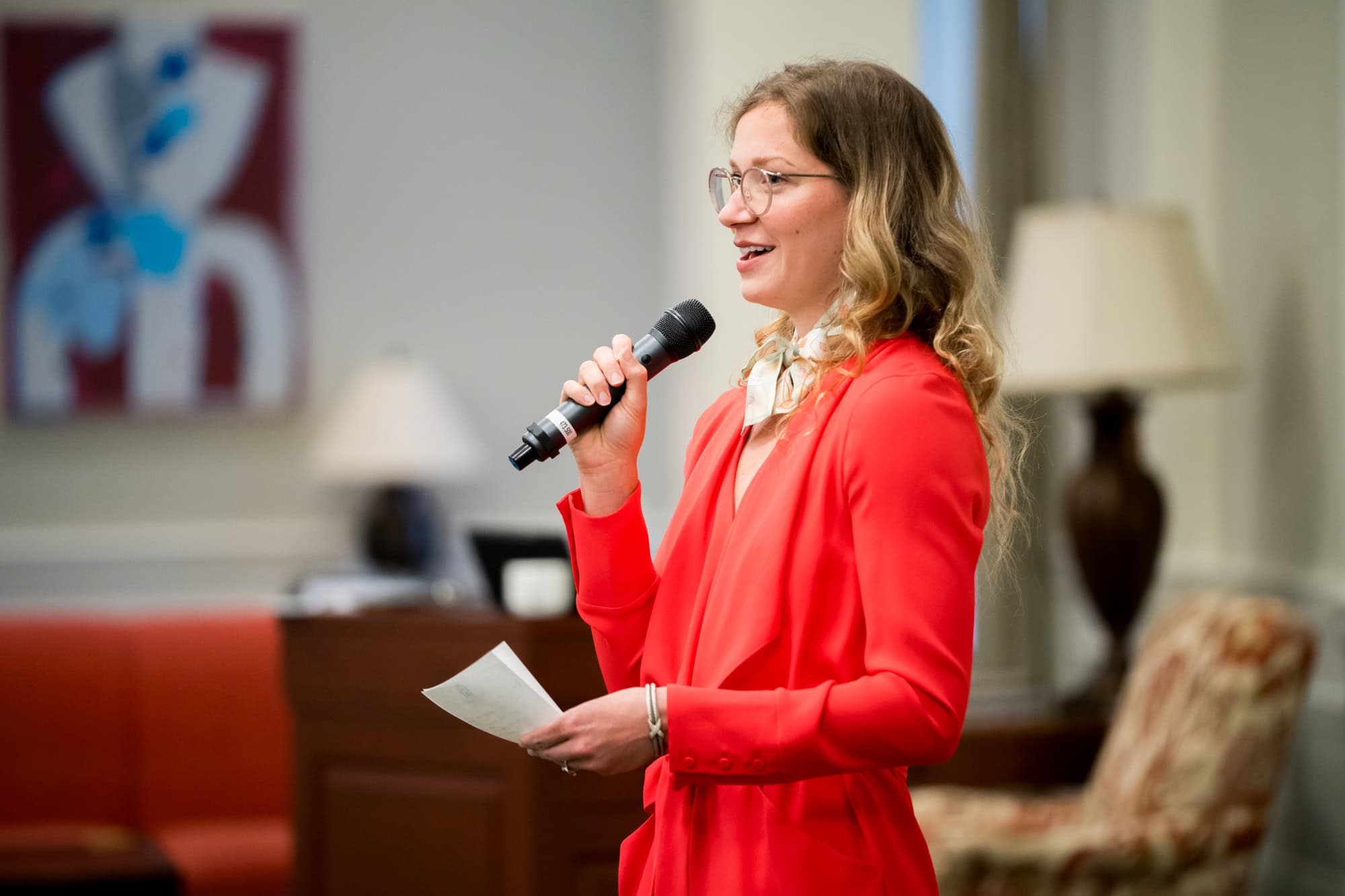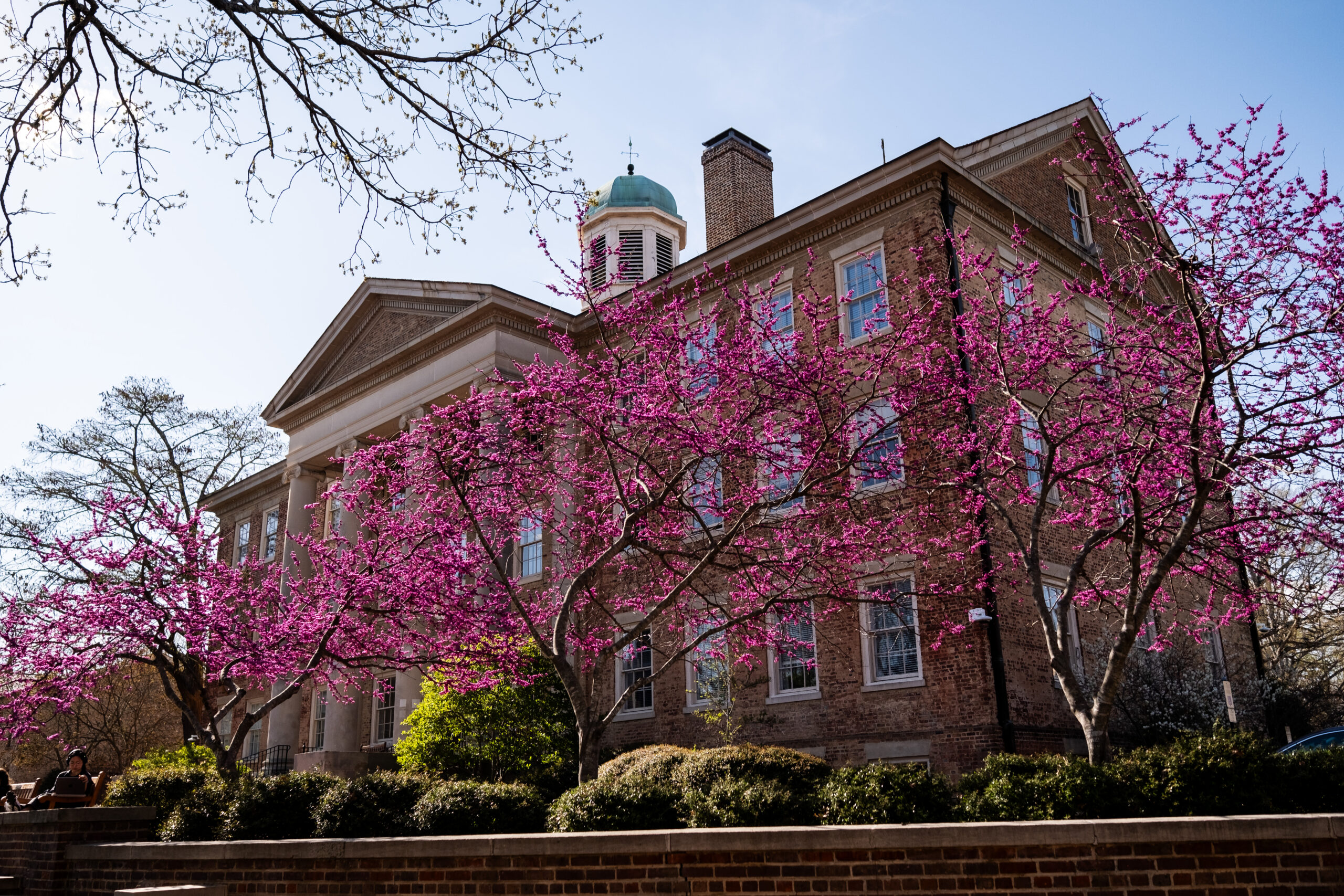
From left: Malik Jabati ’19, Ashton Martin ’2, André Ceccotti ’18, Sarah Mackenzie ’20, and Andrew Buchanan ’23.
A group of Morehead-Cain Young Alumni, all of whom graduated from UNC–Chapel Hill within the last five years, spoke with Catalyze co-host Stella Smolowitz ’26 about leadership lessons gained at Carolina.
Today’s guests include André Ceccotti ’18, Malik Jabati ’19, Sarah Mackenzie ’20, Ashton Martin ’20, and Andrew Buchanan ’23.
The alumni have pursued careers in investing (Malik), entrepreneurship (Andrew), and law (André, Sarah, Ashton). In addition to sharing reflections from their leadership positions as Morehead-Cain Scholars, the guests discuss their most impactful mentors at the University and Summer Enrichment Program experiences through the Program.
Along with Sean Nguyen ’21 and Melanie Godinez-Cedillo ’22, the alumni served on a panel at the Foundation on September 16 about leadership, from managing imposter syndrome to deciding on a career path.
Music credits
The episode’s intro song is by scholar Scott Hallyburton ’22, guitarist of the band South of the Soul.
How to listen
On your mobile device, you can listen and subscribe to Catalyze on Apple Podcasts or Spotify. For any other podcast app, you can find the show using our RSS feed.
Catalyze is hosted and produced by Sarah O’Carroll for the Morehead-Cain Foundation, home of the first merit scholarship program in the United States and located at the University of North Carolina at Chapel Hill. You can let us know what you thought of the episode by finding us on Twitter or Instagram at @moreheadcain or you can email us at communications@moreheadcain.org.
Episode Transcription
(Malik)
Hi, my name is Malik. Malik Jabati. I was class of 2019 here at Carolina and a Morehead-Cain Scholar. Currently, I’m living in New York City, working as an associate at a private equity firm, Charlesbank, where I specialize in technology and technology infrastructure investments.
(Andrew)
Hi, my name is Andrew Buchanan. I graduated with the class of 2023, and right now, I’m starting a company with three of my friends based out of L.A. We’re trying to bootstrap our team, and we’re called Maia.
(André)
Hi, my name is André Ceccotti. I am from Brazil, and I’m now an assistant public defender at the Mecklenburg County Public Defender’s Office in Charlotte, North Carolina.
(Sarah)
Hi, everyone, my name is Sarah Mackenzie. I’m from the class of 2020, and I’m currently a first year law student at the University of Toronto.
(Ashton)
My name is Ashton Martin. I’m from the class of 2020. I live in Washington, D.C. now, and I’m the health policy analyst for the United South and Eastern Tribe Sovereignty Protection Fund.
(Stella)
So first off, what was your favorite Morehead-Cain summer, and how did it impact your life today?
(Malik)
I’ll say one, the NOLS experience was amazing. It kind of taught me a lot about just sort of supporting and being independent in an incredibly challenging and new environment, which are skills that were helpful here at Carolina. My first few semesters and years, and especially after graduating, going into different cities, really being able to say, “Hey, I did this. I lived in the wilderness for 30 days. I can support myself in modern society for however long it takes.” So that was a really fun summer. But actually, my first summer after enrolling at Carolina, my public service summer was really exciting, too. There I got a chance to work in Brazil for a rainforest research foundation called Iracambi Research Center, and I was actually there during the Olympics. So that was really fun, like, a good sort of overlap in 2016. But I also was sort of given a lot of responsibility at a really young age, and just being able to create things out of nothing, and even when it seemed really scary at first, it was a really good lesson and a really good experience for me.
(André)
My favorite summer must be the one that I spent in San Francisco. So it was my second summer after Outward Bound. I was still trying to figure out what I wanted to do. I knew that I wanted to do something in the vein of law, although as an undergrad, I knew that I couldn’t do anything of too much substance. But I found this legal aid organization in San Francisco that’s now called Open Doors, it was called something else back then. And this was the summer of 2015, and that’s important because that was the summer that the Supreme Court came out with the decision that found it to be unconstitutional to ban same-sex marriage. And that decision came out on, I believe, a Saturday, the Saturday before the Pride Parade that was about to happen in San Francisco on Sunday. And obviously, San Francisco being what could be construed as the queer capital of the United States, and as a queer man myself, that was the most fun I had, and it was just incredible. You could, I mean, breathe the love and enthusiasm that was in the air, and I have that memory ingrained in my mind, and I hold it fondly.
(Ashton)
I worked for the Public Defender’s office in Chicago. Being able to integrate with a community that has been left behind or discriminated against in some way, underserved in some way, it gave me a love for public service, putting one’s life in service of a greater good.
(Stella)
We talked a lot about leadership and leadership styles, and I’m wondering if you could touch on who you think is your biggest mentor, whether it was here or out in the workforce, and why is their leadership style something that you admire?
(Malik)
First name is Todd. We worked together at McKinsey & Company, which is where I worked right after graduating. He was a leader that I really respected in that he had found a way to merge both his professional passions and also his personal interests. He was really passionate about health care, particularly public health care, and he centered his professional career around that path. He was responsible for some of the research and helping implement the Affordable Care Act earlier in the decade—I guess we’re in a new decade now, but in like 2014 era, he helped implement the ACA. And while we were at Mackenzie, he’s a partner there now, but he was someone who really trusted the business analysts, which are the entry-level positions, and he kind of gave us room to grow. He allowed us to present, speak at the big meetings with the directors, executive directors, CEOs, and just that trust and mentorship was something that I really admired and something that I kind of hope to carry forward as I grow and progress in my own career.
(Sarah)
I took lots of courses with and worked with Frank Baumgartner in the Political Science Department, who does a lot of work on criminal justice and death penalty stuff. And I think that the approach that he has to using academics as a form of advocacy without people really fully realizing that it’s advocacy is really amazing. I think he does an excellent job of kind of saying, “I am committed to inquiry. I just want to know how the criminal justice system works, and I want to show people how it works. And then once I’m able to show them how it works, I want them to make a decision about whether we all collectively as a community, think that this is fair or not.” And I think that’s a really important approach to creating a world and a justice system that is much more human-centered and much more fair. So yeah, I loved his classes on framing and his death penalty class, and he was my senior thesis advisor, and I really valued all the time I spent with him, for sure.
(Stella)
In one sentence, how would you describe leadership, and why did you choose those specific words to describe it?
(Andrew)
One thing I’ve learned since graduating is that investors invest in ideas and teams, not specific business plans. And not that investors should define leadership, but they reflect opportunities that society should allocate resources to. And those opportunities are teams that function really well together, teams and communities that function really well together and are cohesive and excited to work together generally succeed. And they’re able to turn failures into learning experiences and pick themselves up, dust themselves off without toxic relationships. And that all stems from having a cohesive group. And a leader facilitates that. They’re not necessarily the loudest person, but they build the best team.
(André)
So I describe leadership as an exercise in radical community building. So that’s how I describe it. I want to challenge people to shy away from the idea of leadership as power, leadership as title, leadership as authority. I want people to sort of rethink that definition, that sort of conservative, traditional definition. I think that the most powerful, incredible, thoughtful, mindful leaders I know are folks who have made me feel and made other people feel comfortable, safe, and loved around them. And that for me is what leadership is.
(Sarah)
It’s a dedication to building community, which I think is something that a lot of scholars talk about in the program. But I think there’s a real opportunity at Carolina, given where the university is located and the commitment that the university has to kind of public engagement and engagement with the community more broadly. I think you can just really spend a lot of your time at Carolina interacting with people who are really different than you, learning skills that I think are super important, like how to be a good neighbor and how to show up for people.
(Stella)
What do you feel is the biggest lesson you took away from UNC, and how is it still impacting you today?
(Andrew)
I took away a humble confidence from UNC, humility that I’m going to learn a lot and I don’t know everything, but a confidence to do exactly what I want to do, no matter how ambitious it is. I’ll give you two examples. I wanted to race an Ironman while I was at UNC. I had the humility to know that I would get completely destroyed by the training process and the race, but the confidence to know that I could persevere and complete it. And then that’s translated in my post-college plans because I have the humility to know that starting a company is something that I have very little experience in, and I’m going to learn a lot and make a lot of mistakes and fail. But I have the confidence that I can build a product and a team and create a solution for a problem that I see and potentially succeed.
(Ashton)
I’m here for a reason, I have gifts and knowledge to share with the world, and I should do that confidently. Coming from a small town where there weren’t many opportunities, often you feel like you’re not good enough to take those opportunities or go after that internship or apply for that job, but the Foundation did such a good job of instilling in all of us that, yeah, you belong here.


